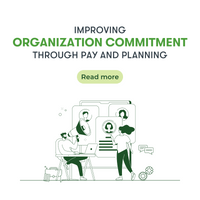
Improving Organization Commitment Through Pay and Planning
Organizational commitment plays a crucial role in evaluating whether employees will stay with the organization and dedicate themselves to achieving its goals. It’s a view of employees’ psychology toward their employers. It can help predict employee satisfaction, engagement, job performance, and job insecurity, all components for determining the health of the company’s culture.
Assessing employees' commitment gives insight into their engagement and the probability of the longevity of their career with the company. Understanding the components of organizational commitment helps HR and leaders ask the right questions to determine how healthy their company's culture is through employee engagement surveys.
The three components of organizational commitment are:
- Affective: the emotional bond
- Continuance: community and income
- Normative: moral obligation
These 3 components of organizational commitments come together to determine how much team members care about their company, and it influences attracting and retaining employees.
In this article, we'll discuss the three types of organizational commitment, how to evaluate if your company culture is healthy or not, and the steps to take to maximize the potential for each.
Affective
A strong affective commitment means the employee is engaged and believes in the company's mission; building this trust begins at the recruitment and application stage. After all, who wants to work for a company that doesn’t align with their values?
Low affective commitment over time can mean the employee is "quiet-quitting" and doesn't actively participate in meetings or social interactions within the organization. To promote affective commitment, HR leaders should collaborate with talent acquisition teams to establish a strategy surrounding the recruitment process to ensure the company is transparent.
Promote affective commitment by:
- Sharing the company's mission statement
- Including and promoting pay transparency in the recruiting process
- Social events, including interactive games/polls in internal social channels
- Monthly all-hands meetings to talk about company initiatives and strategies
Affective commitment means the employee has an emotional bond with the organization. They're there because they want to be there.
Continuance
Continuance commitment can be defined as the fear of missing out; the employee stays with the company for the salary they earn. And it’s not all about the money; FOMO also applies to friendships and emotional connections with coworkers.
With compensation being the most common reason employees quit their jobs, it's important to ensure your company pays competitively. When cash is tight, organizations should leverage equity and career paths to stay competitive and grow the employee's continuance commitment.
Promote continuance commitment by:
- Running compensation reviews with a cadence (once or twice per year)
- Incorporating market adjustments in the yearly cycle
- Establishing an equity grant program
Employees with a strong continuance commitment stay with a company when they know they’re being paid competitively and that the company regularly reviews compensation. They stay because they want to grow with the company.
Normative
Normative commitment is when the employee stays with the company because of a moral obligation. This can be defined as employees who are mentors or are being mentored by someone in the company.
Promote normative commitment by:
- Cultivating mentorship programs
- Establishing career paths for all roles in the organization
- Involving managers in compensation review decisions
To continuously promote normative commitment, HR and leadership teams should establish job levels and career paths, each with level descriptors and expectations to drive employee performance. Openly sharing the available career paths and expectations with employees encourages their buy-in to the organization.
When companies cultivate mentorship opportunities and career paths, employees will be motivated to perform better. Positive normative commitment is fulfilled by the employee's loyalty and duty to the company.
Quantifying Commitment
If a company’s culture is healthy, there’s more likely minimal turnover, and employees are generally happy. Companies can evaluate their workforce's organizational commitment in many ways. Whether it’s via surveys, turnover reports, or conversations with candidates and employees, gathering information is important to see where there may be room for improvement.
Employee Engagement Question Examples:
- Do you enjoy the company’s overall community & culture?
- In what ways can the company improve pay transparency efforts?
- Do you feel that leadership is invested in your individual development & success?
- In what ways is the company culture thriving?
- How might the company culture be lacking?
Strategically considering the workforce’s commitment means looking at data to support the company’s cultural efforts and making changes when issues are consistently brought to the leadership’s attention. In addition to gathering employee feedback, supporting/training managers are also great ways to encourage loyalty. Eventually, only time will tell how committed an employee is to the organization, but the strategies put in place by leadership can be the difference between a thriving culture and a barely-surviving one.
About Kamsa
Kamsa helps companies make intelligent pay decisions. Our hybrid approach to compensation provides global market compensation data and consulting to support your company’s pay transparency efforts. We empower organizations to effectively plan and budget salary and equity reviews by providing reliable, global market data that equip leaders to make holistic + informed compensation decisions.


